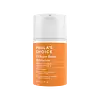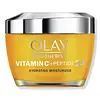What's inside
What's inside
 Key Ingredients
Key Ingredients

 Benefits
Benefits

 Concerns
Concerns

 Ingredients Side-by-side
Ingredients Side-by-side

Water
Skin ConditioningDicaprylyl Carbonate
Emollient3-O-Ethyl Ascorbic Acid
Skin ConditioningDimethicone
EmollientButylene Glycol
HumectantPolyglyceryl-6 Distearate
EmulsifyingAscorbyl Glucoside
AntioxidantSqualane
EmollientHydroxyethyl Acrylate/Sodium Acryloyldimethyl Taurate Copolymer
Emulsion StabilisingAcetyl Sh-Hexapeptide-5 Amide Acetate
Skin ConditioningCitrullus Lanatus Seed Oil
EmollientHydrogenated Lecithin
EmulsifyingTheobroma Cacao Seed Butter
EmollientHydrogenated Phosphatidylcholine
EmulsifyingPentaerythrityl Tetra-Di-T-Butyl Hydroxyhydrocinnamate
AntioxidantSodium Hyaluronate
HumectantOryza Sativa Bran Extract
Skin ConditioningPropanediol
SolventJojoba Esters
EmollientTocopherol
AntioxidantAcetyl Zingerone
AntioxidantCetyl Palmitate
EmollientCaprylyl Glycol
EmollientCetyl Alcohol
EmollientPolyglyceryl-3 Beeswax
EmulsifyingSodium Hydroxide
BufferingSorbitan Olivate
EmulsifyingSorbitan Palmitate
EmulsifyingHelianthus Annuus Extract
EmollientEthylhexylglycerin
Skin ConditioningHexylene Glycol
EmulsifyingSodium Phytate
Polysorbate 60
EmulsifyingSorbitan Isostearate
EmulsifyingLecithin
EmollientRosmarinus Officinalis Leaf Extract
AntimicrobialGlycine Soja Oil
EmollientLysolecithin
EmulsifyingBacillus Ferment
Skin ConditioningCitric Acid
BufferingPolyglutamic Acid
Skin ConditioningBeta-Sitosterol
Emulsion StabilisingPhytic Acid
Squalene
EmollientPhenoxyethanol
PreservativeSodium Benzoate
MaskingPotassium Sorbate
PreservativeWater, Dicaprylyl Carbonate, 3-O-Ethyl Ascorbic Acid, Dimethicone, Butylene Glycol, Polyglyceryl-6 Distearate, Ascorbyl Glucoside, Squalane, Hydroxyethyl Acrylate/Sodium Acryloyldimethyl Taurate Copolymer, Acetyl Sh-Hexapeptide-5 Amide Acetate, Citrullus Lanatus Seed Oil, Hydrogenated Lecithin, Theobroma Cacao Seed Butter, Hydrogenated Phosphatidylcholine, Pentaerythrityl Tetra-Di-T-Butyl Hydroxyhydrocinnamate, Sodium Hyaluronate, Oryza Sativa Bran Extract, Propanediol, Jojoba Esters, Tocopherol, Acetyl Zingerone, Cetyl Palmitate, Caprylyl Glycol, Cetyl Alcohol, Polyglyceryl-3 Beeswax, Sodium Hydroxide, Sorbitan Olivate, Sorbitan Palmitate, Helianthus Annuus Extract, Ethylhexylglycerin, Hexylene Glycol, Sodium Phytate, Polysorbate 60, Sorbitan Isostearate, Lecithin, Rosmarinus Officinalis Leaf Extract, Glycine Soja Oil, Lysolecithin, Bacillus Ferment, Citric Acid, Polyglutamic Acid, Beta-Sitosterol, Phytic Acid, Squalene, Phenoxyethanol, Sodium Benzoate, Potassium Sorbate
Water
Skin ConditioningGlycerin
HumectantIsohexadecane
EmollientNiacinamide
SmoothingDimethicone
EmollientLactic Acid
BufferingIsopropyl Isostearate
EmollientSodium Polyacryloyldimethyl Taurate
Emulsion StabilisingStearyl Alcohol
Emollient3-O-Ethyl Ascorbic Acid
Skin ConditioningPalmitoyl Pentapeptide-4
Skin ConditioningPanthenol
Skin ConditioningSodium Lactate
BufferingTrehalose
HumectantCetearyl Glucoside
EmulsifyingCetearyl Alcohol
EmollientBehenyl Alcohol
EmollientCetyl Alcohol
EmollientStearic Acid
CleansingPalmitic Acid
EmollientDimethiconol
EmollientPEG-100 Stearate
Sodium Benzoate
MaskingParfum
MaskingAscorbic Acid
AntioxidantAvena Sativa Peptide
Skin ConditioningWater, Glycerin, Isohexadecane, Niacinamide, Dimethicone, Lactic Acid, Isopropyl Isostearate, Sodium Polyacryloyldimethyl Taurate, Stearyl Alcohol, 3-O-Ethyl Ascorbic Acid, Palmitoyl Pentapeptide-4, Panthenol, Sodium Lactate, Trehalose, Cetearyl Glucoside, Cetearyl Alcohol, Behenyl Alcohol, Cetyl Alcohol, Stearic Acid, Palmitic Acid, Dimethiconol, PEG-100 Stearate, Sodium Benzoate, Parfum, Ascorbic Acid, Avena Sativa Peptide
 Reviews
Reviews

Ingredients Explained
These ingredients are found in both products.
Ingredients higher up in an ingredient list are typically present in a larger amount.
You might know this ingredient as Ethyl Ascorbic Acid, a more stable version of ascorbic acid.
Like other types of vitamin C, this ingredient has many benefits including reducing wrinkles, skin soothing, dark spot fading, and fighting against free radicals.
3-O-Ethyl Ascorbic Acid interferes with the process of skin darkening, helping to reduce hyperpigmentation. It also encourages the skin to produce more collagen.
Once applied, 3-O-Ethyl Ascorbic Acid is converted to Vitamin C deeper in the skin's layers. This process is slow but makes this ingredient more tolerable for skin.
The optimum pH range for this ingredient is 4 - 5.5
Learn more about 3-O-Ethyl Ascorbic AcidCetyl Alcohol is a fatty alcohol. Fatty Alcohols are most often used as an emollient or to thicken a product.
Its main roles are:
Though it has "alcohol" in the name, it is not related to denatured alcohol or ethyl alcohol.
The FDA allows products labeled "alcohol-free" to have fatty alcohols.
Learn more about Cetyl AlcoholDimethicone is a type of synthetic silicone created from natural materials such as quartz.
What it does:
Dimethicone comes in different viscosities:
Depending on the viscosity, dimethicone has different properties.
Ingredients lists don't always show which type is used, so we recommend reaching out to the brand if you have questions about the viscosity.
This ingredient is unlikely to cause irritation because it does not get absorbed into skin. However, people with silicone allergies should be careful about using this ingredient.
Note: Dimethicone may contribute to pilling. This is because it is not oil or water soluble, so pilling may occur when layered with products. When mixed with heavy oils in a formula, the outcome is also quite greasy.
Learn more about DimethiconeSodium Benzoate is a preservative. It's used in both cosmetic and food products to inhibit the growth of mold and bacteria. It is typically produced synthetically.
Both the US FDA and EU Health Committee have approved the use of sodium benzoate. In the US, levels of 0.1% (of the total product) are allowed.
Sodium benzoate works as a preservative by inhibiting the growth of bacteria inside of cells. It prevents the cell from fermenting a type of sugar using an enzyme called phosphofructokinase.
It is the salt of benzoic acid. Foods containing sodium benzoate include soda, salad dressings, condiments, fruit juices, wines, and snack foods.
Studies for using ascorbic acid and sodium benzoate in cosmetics are lacking, especially in skincare routines with multiple steps.
We always recommend speaking with a professional, such as a dermatologist, if you have any concerns.
Learn more about Sodium BenzoateWater. It's the most common cosmetic ingredient of all. You'll usually see it at the top of ingredient lists, meaning that it makes up the largest part of the product.
So why is it so popular? Water most often acts as a solvent - this means that it helps dissolve other ingredients into the formulation.
You'll also recognize water as that liquid we all need to stay alive. If you see this, drink a glass of water. Stay hydrated!
Learn more about Water